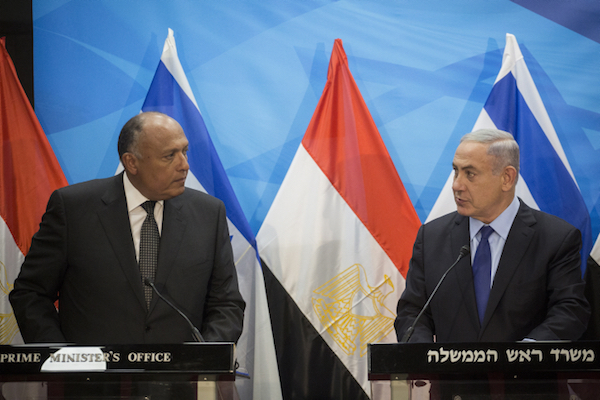Recent interest — by all sides — in reviving the Arab Peace Initiative presents a new window of opportunity. But let’s not get too far ahead of ourselves as long as Benjamin Netanyahu is in charge.

Egyptian Foreign Minister Sameh Shoukry came to Israel on Sunday to meet with Benjamin Netanyahu about the Palestinian peace process, the first such visit in nearly 10 years.
Egypt, which until the 2011 revolution was a regular partner in American-led peace efforts, appears to be making a move to reassert its leadership in the region, and perhaps take advantage of a temporary vacuum of American leadership all but guaranteed by the upcoming presidential elections.
Recent months have seen a reinvigorated interest in the 2002 Arab Peace Initiative (API) — the Arab League’s offer to Israel of normalized relations if Israel simply adopts the widely accepted parameters of a two-state solution (and withdraws from the Golan Heights).
And while Netanyahu and company have long sought to flip the API on its head, by normalizing ties with Arab states prior to making peace with the Palestinians, an approach the Arab world has flatly rejected, it is still very noteworthy that the Israeli prime minister has nonetheless been discussing the Saudi-led framework with increasing frequency. Early this summer, the Quartet (the U.S., EU, UN and Russia) all but endorsed the API as the best path for revisiting peacemaking efforts.
So what is happening in Jerusalem and Cairo? As the only Arab heavyweight to have diplomatic ties with Israel, Egypt is the only regional power positioned to reach out and hear exactly how far Israel is actually willing to go. That could indicate a post-Paris concerted effort to try and create some momentum around the API, or it could just be another Egyptian effort to reassert its regional leadership after half a decade of instability and debilitating regime changes.

The other factor is that Israel long hoped the mutual threat of an Iranian nuclear program would create opportunities for an alliance with Arab states in a way that allowed it to side-stepped the Palestinian issue. With the Iranian nuclear threat all but neutralized, it could be that Netanyahu is beginning to re-examine his calculus of Israeli interests and his strategy for finding a place for Israel in the region.
The API banked on the idea that the Arab offer of acceptance in the Middle East could serve as a enough of a sweetener to Israel that the latter might finally consider make the necessary sacrifices on the Palestinian issue in which it otherwise uninterested.
After all, Benjamin Netanyahu has made it very clear in all 10 years of his premiership that he prefers the status quo of occupation over the risks inherent in a two-state solution — the security risk of withdrawing troops from the West Bank, and the political risk of withdrawing half a million settlers.
Could it be that the prospect of formal economic and security ties with the Arab world is now worth those risks? Or perhaps the Israeli prime minister just understands that in the current international political climate, he can’t push aside any outstretched hand.
After all, Netanyahu has always been a master at sabotaging peace processes before they can force him to make any difficult decisions — either by drawing red lines he knows Palestinians cannot cross, or by literally sabotaging the process has he did in the late 1990s and again in early 2014. So what’s the risk?
Either way, regardless of whether Benjamin Netayanhu is actually testing the waters or just going through the motions to appease Egypt and the world, the fact of the matter is that the Saudis and Egyptians are extending a hand to Israel. “The current state of affairs unfortunately is neither stable nor sustainable, it does not conform with the hopes and aspirations of both peoples, nor with those of the peoples of the region, and the world,” Foreign Minister Shoukry said in Jerusalem Sunday.
And while Shoukry described Egypt’s commitment to “supporting” a resolution to the Palestinian-Israeli conflict as “steadfast and unwavering,” that doesn’t mean the same is true of its patience with Netanyahu.
There appears to be a new window of opportunity in sight, however, there is nothing to indicate that the Israeli prime minister — who has done more than anyone to prevent the creation of a Palestinian state — is about to change his ways.


